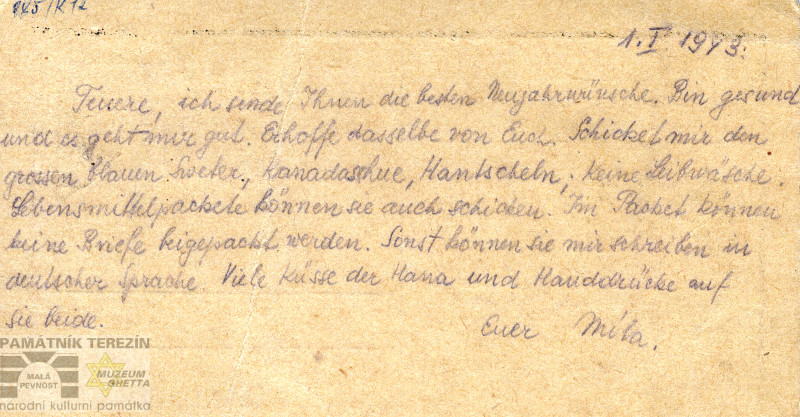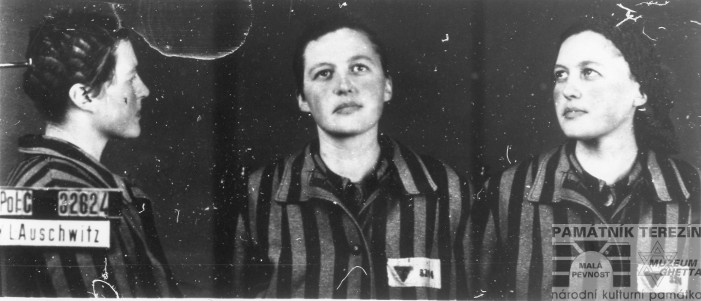
MÚ AAV, AAV ČR, f. Zdeněk Nejedlý, The collection of photos, k. F3, inv. č. 133, graduation photo of Zdenka Nejedlá, June 1927.
In addition to lack of food, work exhaustion and mistreatment by the supervisory personnel, the inhuman conditions of imprisonment in Nazi repressive facilities also brought along dismal hygienic and medical care. To provide sick prisoners with at least the minimum of needed care, the official authorized doctors were helped by numerous doctors, medics and nurses from among the prisoners themselves. Their uneasy aim was, under the given conditions and in shortage of basic medicines, medical supplies and facilities, to create at least seeming conditions for treatment. Among these doctors-prisoners were Mr. and Mrs. Nedvěd, whose human and professional approach remained in the memories of many prisoners.
Miss Zdenka Nejedlá, later Mrs. Nedvědová, was born on 20th August 1908. Despite the humanistic inclinations of her father Zdeněk Nejedlý, she decided to study medicine. At a medical school she met same-age Miloš Nedvěd, whom she married not long after passing the final exam at the university. Soon, their loving relationship was blessed with a baby daughter Hana.
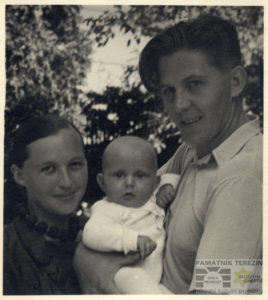
MÚ AAV, AAV ČR, f. Zdeněk Nejedlý, Miloš Nedvěd, k. 3, inv. č. 161, photo of the Nedvěd’s family, undated.
While Zdenka’s affection for small patients resulted in her decision to open a paediatric practice, her husband Miloš immersed, with the same ardour, in studying medical science and research. Soon he became a respected internist at a prominent propaedeutic clinic. From the youth, similarly to their left-wing parents, both of them were engaged in party activities and organizations of the Communist Party.
Nevertheless, the escalated time of the late 30s was not favourable to their carefree family life. They could not put up with the occupation of the rest of the Czech lands, and from the beginning they became involved in the underground movement. In their medical surgeries in Prague, they secretly spread illegal publications and distributed food for the families of the arrested. Unfortunately, the Prague Gestapo soon learned about their activities and arrested Miloš in April 1942 and a few days later also his mother and wife. Small Hana spent the rest of the war in the care of their close relative Mrs. Václava Pohanová.

MÚ AAV, AAV ČR, f. Zdeněk Nejedlý, Miloš Nedvěd, k. 1, inv. č. 46, correspondence of Hana Nedvědová to Miloš Nedvěd, the letter from December 1943.
After half a year’s stay in Pankrác Prison, all three were transported to the police prison in Terezín and then separated. While Marie and Zdenka Nedvědová were placed in the third courtyard, Miloš went to the first courtyard. For their medical education they were almost immediately assigned to perform local health services, which brought along a number of advantages. Not only did they not have to do physically demanding work, but their positions also allowed them to meet while consulting the diagnoses of sick prisoners. Later on they found even more opportunities to meet for at least short moments, e.g. with the possibility to use men’s showers in the first courtyard on Saturdays. “We stripped in the bathroom hall and then should go straight to the showers. To the right there was a door leading to the male infirmary. Men had the keys of that door. I sacrificed showering and when the right moment came, the door opened a little and I could speak to my husband“[1], described Zdenka after the war. These small things and especially the care of sick fellow inmates helped them survive their time in Terezín. Although staying there for only less than six weeks, the testimonies of many prison patients prove that they did their work responsibly and conscientiously. After the war Petr Osvald recalled: “At work I injured my finger and I got blood poisoning in it. Dr. Nedvěd cut my wound and cleaned it, saving so my finger. Dr. Nedvěd was respected in the fortress; he managed the infirmary carefully, and when working he even put on a white coat“.[2]
Nevertheless, soon unexpected news came and both of the married couple were put on a transport to Auschwitz. When they arrived in Birkenau in January 1943, they were shocked by the conditions that prevailed there. Just like in Terezín, both of them worked in infirmaries and under non-standard conditions had to heal sick fellow prisoners. However, this work became fatal for Miloš. He was infected with typhus and eventually died in March 1943. Unhappy Zdenka learned the sad news a month later when her body was slowly recovering from typhoid infection. Half a year spent in Auschwitz took away not only her husband but also a lot of her physical strength. Yet, she did not give up hoping that one day she would manage to reunite with her daughter and parents again.
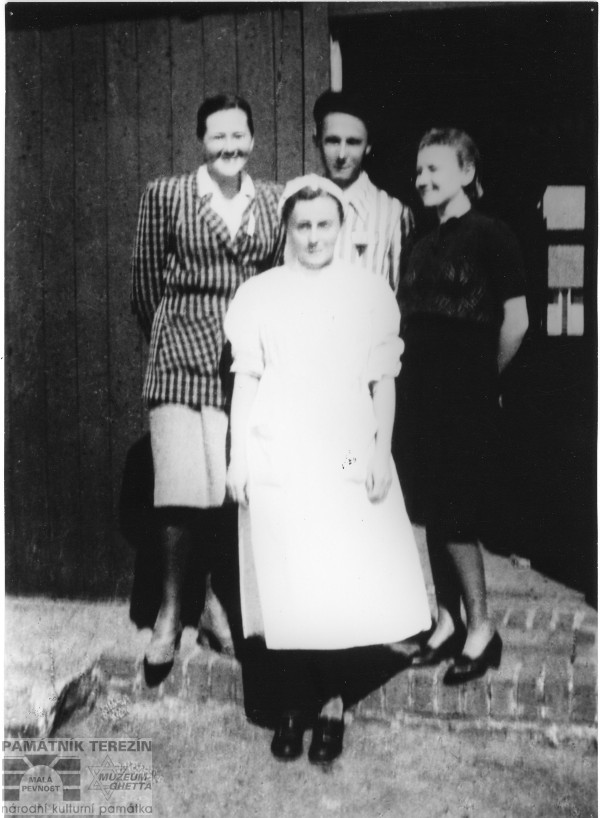
FA PT, 4335, the photo made after the liberation of KT Ravensbrück. Zdenka Nedvědová-Nejedlá is standing on the very left, May 1945.
In mid-August 1943, a rumour went around the camp that all local Czech women prisoners were to be transported to the concentration camp in Ravensbrück. Soon after Zdenka’s arrival at that new location, she took care of the sick again. Not only did she try to provide adequate care, but she also encouraged the others in their hope for better times. This part of her nature made her very quickly popular among the women inmates, who gave her a nickname “The Sun of the Camp.” Selflessly she helped both sick women and babies born in the camp.
With the end of the war, all women prisoners of the camp were sent on a death march, with the exception of sick women and nursing staff, who were allowed to stay. This way the camp’s hospital, led by the unofficial commander Zdenka Nedvědová, became the main camp point. Thanks to her determination and the common will of all, the camp was kept in order until the arrival of the Red Army. Instead of leaving the place along with the other released women inmates, she decided to stay after the liberation for some time yet to help build a functioning hospital. She went to Prague on one of the last transports at the end of May 1945. Immediately after returning to her homeland, she sought out her daughter Hana and also her parents, who had returned from emigration.
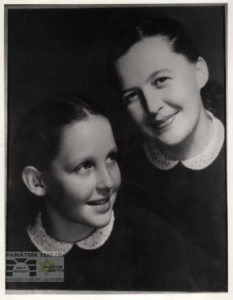
MÚ AAV, AAV ČR, f. Zdeněk Nejedlý, The collection of photos, k. F6, inv. č. 458, Zdena Nedvědová with her daughter Hana, September 1945.
War experiences aroused Zdenka’s need to deal with the past. Therefore, soon after the war, she joined the Association of Liberated Political Prisoners in Prague and did not hesitate to testify about the horrors perpetrated in the concentration camp Ravensbrück even in front of the British military court.
Although Zdenka was affected by the loss of her husband, brother and brother-in-law, she soon returned to her original profession and worked as a paediatrician again in Prague quarter Podolí. She was dedicated to the issues of health and educational care until 1964, when she retired.
After the war, she continued to be politically active in the Communist Party. However, after she had publicly condemned the Soviet occupation in 1968, she left the party. She died at the age of almost ninety on 14th June 1998.
More about the fates of Zdenka Nedvědová and Miloš Nedvěd is to be found in “Terezínské listy” (Terezín Yearbook) No. 43/2015.
Ha
[1] Terezín Memorial, Collection of Memoirs, No. 1225 (Zdenka Nedvědová).
[2] Terezín Memorial, Collection of Memoirs, No. 979 (Petr Osvald).

